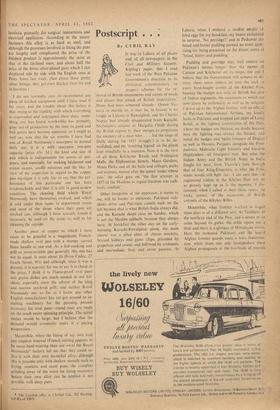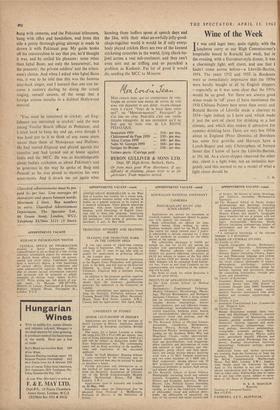Postscript . .
By CYRIL RAY IT was in Lahore of all places and, of all newspapers, in the Civil and Military Gazette, Kipling's paper, that I read last week of the West Pakistan Government's direction to its divisional commissioners, 'to prepare schemes for the re- moval of British monuments and names of roads and places that smack of British imperialism.' Many had been removed 'already: Queen Vic- toria in marble or, it may be. in bronze is no longer in Lahore or Rawalpindi. and S). Charles Napier had already disappeared from Karachi. Nicholson's column at Margalla ('built during the British regime by their stooges to perpetuate the memory of a man who . . . led the siege of Delhi during the 1857 struggle') is to be de- molished, and the 'insulting legend' on the plinth kept mindfully in a museum. Now it is the turn of all those Kitchener Roads and Wellington Malls, the Elphinstone Streets, Mayo Gardens, M into Parks and all the halls and colleges, parks and avenues, named after the queen 'under whose rule.' the edict goes on, 'the first 'attempt in 1857 of the Muslims to regain freedom was ruth- lessly crushed.'
Other footprints of the oppressor, it seems to me, will be harder to obliterate. Pakistani rick- shaws drive and Pakistani camels walk on the left because that is what British India always did, and the Karachi shops close on Sunday, which is not the Muslim sabbath, because they always have. At 'breakfast the other day •on the early- morning Karachi-Rawalpindi plane, the main course was a piled plate of cheese omelette, braised kidneys and game chips, preceded by grapefruit and cereal, and followed by croissants and marmalade,, fruit and sweet pastries. At
Lahore, when I ordered a modest couple of fried eggs for my breakfast, my bearer exclaimed in surprise, 'No porridge?' and at Peshawar the bread-and-butter pudding seemed no more appe- tising for being presented on the dinner menu as 'bread, butter and pudding.'
Pudding and porridge may well endure on Pakistan's menus loneer than the names of Curzon and Kitchener on its Maps, nor can I believe that the Government will remove or de- stroy those stone tablets let into the rock it every hard-fought corner of the Khyber Pass, bearing, the badges not only of British but also of Indian regiments, the successors to which are now aliens by nationality as well as by religion. I drove up to the :Nfghan frontier w lib an of11%.:iiil' of Pakistan International Airlines, my kindly. hosts in Pakistan, and stopped just short of Landi Kotal, at the tightest constriction of the Pass, where the badges are thickest, no doubt because here the lighting was always the, fiere-est, and noted the badges and battle honours of Dogras as well as Dorsets, Punjabis alongside the Pom- padours, Mahratta. Light Infantry .and Gordan Highlanders--all foreigners now. But. what the Indian Army and the British Army in India fought for here, from Victoria's time thro;:gh that of four King-Emperors, is what the P.iki- stanis would still, tight for: I am sure that regimental tablets in the Khyber Pass will be as piously kept up as is the memory. I dis- covered, when 1. called at their mess. he rocky corner, of the succession of Brit.sh colonels of. the Khyber Rifles.
Meanwhile, what frontier warfare is %+;tged these days is of a different sort. At Torkham. at the northern end of the Pass, and a do/en or so miles beyond its gullet, the defile 'opens Out a little and there is a glimpse of Hinitila an snows. Here the turbaned Pakistani and the kepAl Afghan frontier guards essay a wary fraternisa- tion. while from one side loudspeakers blare Afghan propaganda at the bus-loads of worsts hung with cameras, and the Pakistani tribesmen, hung with rifles and bandoliers, and from this side a pretty thorough-going attempt is made to drown it with Pakistani pop. My guide broke off his conversation to say that yes, he'd thought it was, and he smiled his pleasure: none other than Iqbal Bano, not only the housewives', but the peasants', the private soldiers' and the tribes- men's choice. And when 1 asked who lqbal Bano was, it was to be told that this was the famous play-back singer, and I learned that one can be- come a nation's darling by doing the actual singing, oneself unseen, of the songs that a foreign actress mouths in a dubbed Hollywood musical.
'You must be interested in cricket: all Eng- lishmen are interested in cricket,' said the nice young Tourist Board official in Peshawar, and I tried hard to keep my end up, even though I was hard put to it to think of any name more recent than those of Makepeace and Hallows. He had toured England and played against her counties and had turned out at home against India and the MCC. He was as knowledgeable about India's cricketers as about Pakistan's and as generous in the way he spoke of Baig and Pataudi as he was proud to mention his own team-mates. And it struck me yet again what humbug those buffers spout at speech days and the like, with their what-an-awfully-jolly-good- chaps-together world it would be if only every- body played cricket. Here are two of the keenest cricketing countries in the world, lying cheek-by- jowl across a vast sub-continent, and they can't even sort out so trifling and so parochial a problem as Kashmir. Fat lot of good it would do, sending the MCC to Moscow.



































 Previous page
Previous page